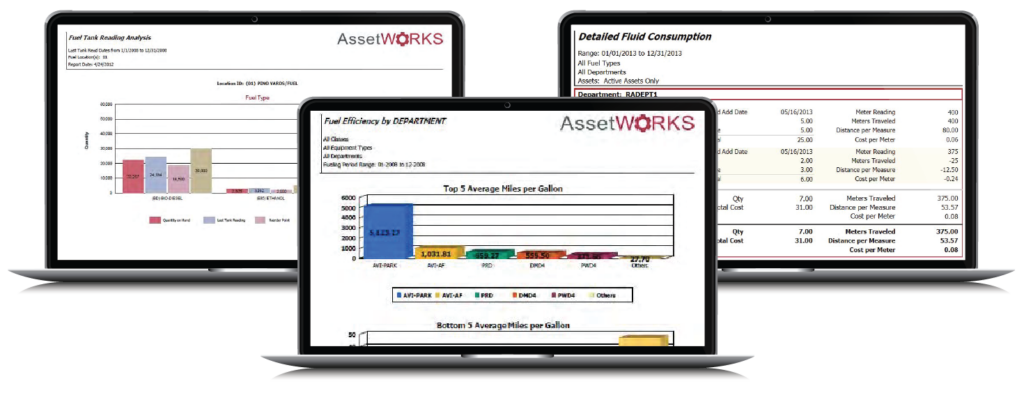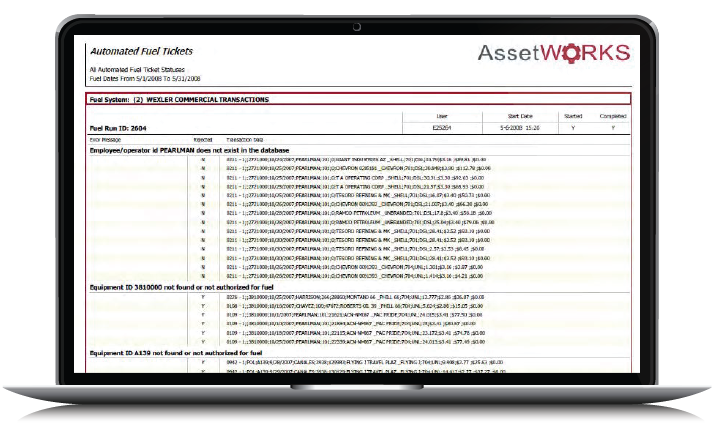Fuel management software is a specialized computer program to track and manage fuel usage in various industries. It helps organizations monitor fuel consumption, optimize routes, and control costs by providing real-time data, analytics, and reporting tools. Fuel management software aids in reducing fuel wastage, improving fuel efficiency, and ultimately saving on fuel expenditures.
Fuel management is crucial for fleets due to its impact on cost control, particularly operational budgets, where fuel expenses often make up a significant portion. Fuel monitoring enables fleets to monitor and optimize fuel consumption, reducing costs and improving financial performance. Moreover, fuel monitoring aids in identifying inefficiencies, minimizing vehicle downtime and ensuring efficient resource utilization, ultimately enhancing operational efficiency and profitability.
This guide is a resource for fleets looking to optimize their fuel management strategies. It highlights the numerous benefits of utilizing fuel management software and provides practical insights on selecting, implementing, and maximizing the ROI of such software. By the end of this guide, fleets will be well-equipped to enhance operational efficiency, reduce costs, and ensure compliance while managing their fuel resources effectively.
Benefits of Fuel Management Software
Fuel management software offers a range of advantages for fleets, including cost savings through optimized fuel consumption, enhanced accuracy in tracking fuel-related data, and the invaluable benefit of real-time tracking to address any issues or inefficiencies in fuel usage. These following benefits collectively contribute to improved financial performance and operational efficiency:
Cost Savings
- Reduced Fuel Theft
Fuel management software can significantly reduce fuel theft through real-time tracking of fuel transactions. It detects discrepancies and unusual fuel consumption patterns, flagging potential theft or unauthorized usage. Some fuel management software includes security measures like access control and PIN verification, ensuring that only authorized personnel can access fueling equipment, further preventing theft. - Improved Fuel Efficiency
Fuel management software provides valuable data insights into fuel consumption patterns and vehicle performance. It enables fleets to identify inefficiencies, optimize routes, and implement fuel-saving strategies based on real-time data, ultimately reducing fuel wastage.
Environmental Impact
- Compliance with Environmental Regulations
Fuel management software plays a role in improving compliance with environmental regulations by accurately tracking and reporting fuel usage and emissions data. It helps fleets monitor their environmental impact in real-time, allowing for timely adjustments to reduce emissions and stay within regulatory limits. Automated reporting features ensure fleets can generate the necessary documentation to demonstrate compliance with relevant authorities, simplifying the compliance process.
Operational Efficiency
- Real-time Tracking
Fuel management software enables fleets to monitor fuel consumption, vehicle locations, and other critical data. This real-time tracking empowers companies to make informed decisions promptly, optimize routes for fuel-efficient journeys, and respond rapidly to any irregularities or issues – allowing organizations to streamline operations, reduce downtime, and improve overall productivity. - Data Analytics and Reporting
By analyzing historical data in fuel management software, organizations can identify trends, inefficiencies, and areas for improvement, allowing fleets to implement targeted strategies for optimizing fuel usage, maintenance schedules, and route planning. The software’s reporting features provide insights, enabling better decision-making, cost reduction, and operational streamlining.
Security Measures
- Preventing Unauthorized Access/Fuel Theft
Fuel management software enhances security measures with access controls to prevent unauthorized fuel access or theft. It tracks all fuel transactions to deter potential misuse. The software’s features, such as real-time tracking and alerts, allow for immediate detection of suspicious activities, enabling quick response and intervention to protect assets and resources.

Types of Fuel Management Software
Fuel management software is diverse, with various types tailored to meet specific business needs. Different categories and types of fuel management software solutions, from basic standalone systems to comprehensive, integrated platforms, make selecting the right software that aligns with your organization’s objectives and requirements crucial.
Standalone Fuel Management System
A standalone fuel management system is a specialized software application dedicated solely to fuel-related activities within an organization. It operates independently, separate from other business systems, and focuses exclusively on tasks- like fuel consumption, monitoring fuel inventory, and managing fuel transactions.
These systems are for smaller fleets or specific departments within larger organizations with limited fuel management needs. While they offer essential functionality for tracking and controlling fuel usage, they may need comprehensive features found in integrated enterprise-level solutions.
Integrated Fuel Management Systems
An integrated system combines fuel and fleet management functionalities into a unified platform. It allows fleets to optimize their fuel-related activities and management of their vehicle fleets seamlessly. This integration empowers fleets to make data-driven decisions by providing a holistic view of fuel consumption, vehicle performance, maintenance needs, and driver behavior.
An integrated system offers features, including real-time tracking, vehicle maintenance scheduling, route optimization, and driver performance monitoring. By merging these critical functions, organizations can improve operational efficiency, reduce fuel costs, minimize vehicle downtime, enhance driver safety, and ensure compliance with environmental regulations.
Closed Based Fuel Management Systems
Cloud-based solutions are comprehensive digital platforms designed to streamline and enhance the management of fuel-related operations for organizations. These systems utilize cloud technology to centralize and automate various aspects of fuel tracking, consumption monitoring, and inventory management. Key features include real-time data collection from fueling stations and vehicles, secure data storage, and remote access via web or mobile applications.
Through cloud-based fuel management, companies gain immediate visibility into fuel consumption patterns, detect inefficiencies, and make informed decisions to optimize fuel usage. Cloud-based solutions also offer predictive analytics and reporting tools that help with cost-reduction strategies, such as route optimization, fuel theft prevention, and maintenance scheduling.
Cloud-based solutions can integrate with other business software, like fleet management software, to provide visibility into fuel-related expenses and streamline administrative processes. Secure cloud storage allows data to be accessible from anywhere, ensuring seamless scalability and flexibility for fleets of all sizes.

Features to Look for in Fuel Management Software
When evaluating fuel management software, it’s crucial to consider several key features to ensure it meets your organization’s needs. These features range from comprehensive data tracking to integration capabilities, which can impact fuel management efficiency and cost-effectiveness.
Fuel Monitoring and Tracking
Fuel tracking allows organizations to maintain accurate fuel usage records, ensuring transparency and accountability. It also provides valuable insights into fuel efficiency, helps detect anomalies or discrepancies, and supports data-driven decision-making to optimize fuel management processes.
To monitor fuel usage, organizations will record fuel transaction data in their fuel system, including date, time, vehicle ID, and fuel quantity. With a comprehensive fuel system, such as AssetWorks FuelFocus, this is automated. The software will then compile and organize this data, allowing you to monitor fuel consumption, expenses, and inventory levels through reports and analytics, helping you make informed decisions and optimize your fuel management processes.
Inventory Management
To track fuel inventory in fuel management software, you must input the initial inventory levels and set reorder points. The software will update inventory data as fuel gets dispensed, received, or transferred, ensuring real-time accuracy. You can monitor fuel inventory levels through the software’s interface and receive alerts or reports when inventory reaches predetermined thresholds, enabling proactive replenishment and efficient management of fuel stocks.
Reporting and Analytics
Fuel management software should allow organizations to perform reporting and analytics through the following steps:
- Collect Relevant Data
Ensure all relevant fuel-related data is accurately recorded and stored within the software- including data on fuel transactions, consumption rates, expenses, and vehicle performance metrics. - Analytic Tools
Use the software’s built-in analytical tools or data visualization features, such as charts, graphs, or tables, to analyze data. - Custom Reporting
Generate customized reports tailored to your organization’s specific needs and objectives. - Decision-Making
Make informed decisions from analytics to optimize fuel usage, reduce costs, improve operational efficiency, and implement strategies for sustainable fuel management practices.
Integration Capabilities
An integrated fuel management system offers significant advantages because it consolidates and synchronizes all fuel-related processes and data within a single, cohesive platform. This integration enhances operational efficiency by eliminating the need for manual data entry and reducing the risk of errors. It also provides real-time visibility into critical information like fuel consumption, expenses, and inventory levels, enabling organizations to make timely and informed decisions.
Integrating with solutions, such as fleet management software, offers complete visibility into how fuel impacts the entire organization, allowing organizations to optimize fuel usage, reduce costs, and identify areas for improvement.
AssetWorks FuelFocus integrates directly with fleet and asset management software, allowing fleets to improve more than just fuel consumption. “There are a lot of things that the integrated fuel solution can do,” said the City of Toronto, Lloyd Brierley, in a case study. “Prior to the upgrade, reporting on fuel usage and tank levels involved a lot of human intervention, time, and effort. Doing so manually was an error-prone process that required emails, spreadsheets, charts, and paper forms. Using FuelFocus will help us automate many of those previously manual processes. It’s all about doing things efficiently and effectively while eliminating errors,” said Brierley.
User-Friendly Interface
User-friendly interfaces prevent errors and data entry mistakes by guiding users through processes logically and providing clear instructions. A user-friendly interface simplifies complex tasks, allowing users to navigate the system effortlessly. This boosts efficiency, reduces the time spent on administrative work, and reduces costly errors by maintaining data accuracy.
Security Measures
Obtaining a fuel management system with security measures is crucial to protect sensitive fuel-related data and prevent unauthorized access or breaches. Without these security measures, organizations risk exposing critical information to threats and compromising data integrity. Implementing robust security measures ensures compliance with regulations, prevents costly cyberattacks, and safeguards the system’s reliability, ultimately safeguarding the organization’s reputation and operations.
Choosing the Right Fuel Management Software
Choosing the right fuel management software for your organization involves following several steps:
Assess Business Needs
Evaluate your organization’s specific requirements. Consider factors such as the size of your fleet, fuel consumption patterns, reporting needs, and any unique challenges or goals related to fuel management.Define Budget
Determine your budget constraints and allocate resources accordingly. Investing in a comprehensive fuel management system can yield significant cost savings and efficiencies over time.Scalability
Consider whether the software can scale to accommodate future growth and changing needs. A flexible system that can adapt as your organization evolves is a valuable long-term investment.- User Training and Support
Assess the vendor’s customer support and training offerings. Ensure they provide user training during implementation and ongoing usage, including troubleshooting and updates. Vendor Reputation and Customer Reviews
Research and compare various fuel management software solutions available in the market. Look for reputable vendors with a track record of delivering reliable and secure systems. Try seeking out user reviews and asking for references from the vendor. Hearing from organizations who implemented the software can provide valuable insights into its performance and reliability.

Implementing Fuel Management Software
- Installation and Setup
Work with the chosen vendor to customize and configure the software to align with your organization’s requirements. Ensure the software integrates seamlessly with existing systems and databases, such as fleet management software. It is also worth conducting a pilot test of the software with a small group of users or vehicles to identify potential issues or areas of improvement. - Data Migration (if applicable)
If transitioning from a manual or legacy system, plan and execute data migration to transfer existing fuel-related data into the new fuel management system. Ensure the data remains accurate throughout the migration process. - Training Employees
Provide training to employees who will be using the fuel management software. Ensure the employees are proficient in using all relevant features and can navigate the system efficiently. - Ongoing Maintenance and Support
Provide ongoing user support to address any questions, issues, or technical problems that users may encounter. Maintain open communication with the software vendor for technical support and updates.
Implementation Challenges and Solutions
Implementing fuel management software can pose several common challenges for organizations. Data integration issues can arise as the software needs to seamlessly connect with existing systems, such as vehicle tracking or inventory management software, which may require complex data mapping and compatibility checks. Data accuracy is crucial, as inaccurate fuel consumption or inventory data can lead to financial losses or operational inefficiencies, requiring rigorous monitoring and data validation processes. The data collected by fuel management software is valuable, so it is essential to implement robust cybersecurity measures to protect against data breaches and unauthorized access.
To overcome these implementation challenges when deploying fuel management software, consider these tips:
- Thorough Planning
Start with a comprehensive implementation plan that outlines clear objectives, timelines, and responsibilities. Involving key stakeholders from various departments can help ensure alignment with organizational goals. - Effective Training
Invest in a vendor who offers various training opportunities for staff to ensure they are comfortable and proficient with the software. Conduct regular follow-up sessions and provide ongoing support to address user concerns or issues. - Data Quality Assurance
Implement robust data validation processes to ensure the accuracy and reliability of the data input into the system. Regularly audit and clean the data to prevent inaccuracies from affecting decision-making. - Scalability and Flexibility
Choose software that is scalable and flexible to adapt to changing business needs. This ensures the software can grow with your organization and accommodate new features or integrations as necessary. Regularly review and update your software to stay current with industry standards and security requirements.
Conclusion
Fuel management software is a powerful tool for modern fleets seeking to optimize fuel-related operations. Its multifaceted capabilities, ranging from real-time tracking and inventory management to cost reduction and sustainability initiatives, underscore its significance in the contemporary landscape. However, the successful implementation of such software necessitates a strategic approach, such as planning, user training, data integrity, and a focus on scalability.
As technology evolves and environmental concerns become increasingly pressing, fuel management software will remain crucial for organizations striving to maximize fuel efficiency, reduce costs, and make meaningful strides toward a more sustainable future. Embracing this technology empowers fleets to thrive in a competitive market and contributes to a cleaner, more resource-efficient world.
Ask yourself these questions:
- Are you committed to sustainability?
- Do you struggle with accurate reporting and compliance?
- Do you have issues with fuel theft or misuse?
- Are fuel costs a significant part of your budget?
- Is your current fuel system manual or error-prone?
- Do you need real-time visibility into fuel-related data?
If you answered “yes” to any of these questions, it is time to look into a new fuel management system.
Additional Resources
If you would like to learn more about fleet management software and more about AssetWorks’ fleet solution, check out these additional customer references and resources:
City of Austin, TX Case Study
What is FuelFocus?
5 Ways Fleet Can Reduce Fuel Bills
FuelFocus: Fuel Management Software
The Evolution of AssetWorks FuelFocus Technology












